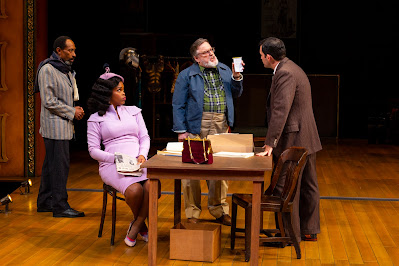By James V. Ruocco
American racism is the explosive subject matter of Alice Childress's conversation-fueled 1955 landmark work "Trouble in Mind," the final production of Hartford Stage's 2022-2023 season of plays that included "The Winter's Tale," "The Art of Burning" and "The Mousetrap."
As theatre, it is sharp and poignant.
It is pertinent and full of rage and protest.
It is a play about voice and discovery.
It is an important work of great platform and great bones.
It also brings its audience to a standstill.
But then again, that's the point.
Originally, the production was commissioned for a Broadway transfer, but when Childress adamantly refused to change the play's ending to accommodate a largely white theatergoing audience, plans to move her play uptown were immediately scrapped.
Regardless, the struggle, opinion, dignity and resolve of "Trouble in Mind" endures.
And rightly so.
Set in a rehearsal room - a theatrical battleground of sorts - the play's four main black characters are forced to play lynched victims, mammies, servants or whittling "colored folk" (the narrative is set in the deep south) while at the same time, acting, smiling and nodding agreeably without complaint or hesitation when asked to recite dialogue or act out situations concerning their overtly racially prejudiced roles.
As actors, they also must contend with a pompous, egomaniacal white director ("You think it's wonderful to be white," he yells) who often belittles them or continually reminds them that they have been hired to play a part and not question the logistics, the misgivings or the sloppiness of the script itself.
They are working actors and nothing more. They could also be replaced at the drop of a hat.
As playwright, Childress navigates her play about backstage racism with edge, with satire, with intensity and with narrative command. There's eloquence and passion here, mixed with spark, attitude, debate and consequence. More importantly, the collective stories of "Trouble in Mind" bespeak the actual anger of the era she writes about as it was recorded and experienced at the time of the play's setting.
There's a push and pull to it all, with friction and conflict front and center, mixed evenly with a play-within-a-play premise interspersed with bouts of comedy, language, power plays and industry flamboyance meant to be either humorous and offensive or legitimate and binary. Elsewhere, there's also some fun bits about Bridgeport and Yale University involving the character of Judy Sears, an over-anxious white actress and graduate of Yale hoping to make her mark in the entertainment industry. Early on, the director's explanation of the playing space (stage right, stage left, downstage center, etc.) to Judy is hilariously executed with enjoyable dash and panache.
Staging "Trouble in Mind," director Christopher D. Betts positions a combative and humorous piece of stagecraft that is witty, intelligent, dramatic and thought provoking. Directorially, he is akin to machinations of the Childress playtest, its unspooling, its observations, its rebelliousness, its playing ground, its urges, its honesty and its extremism.
There's lots going on, but the details, the cues, the expressions, the feel and the flow of the piece are sustained with natural thrust and immediacy as are the shifts in tone, character and story evolution. Lots of questions are raised by the playwright and Betts provides the answers with heightened awareness, element and articulated accompaniment.
"Trouble in Mind" stars Heather Alicia Simms (Wiletta Mayer), John Bambery (Al Manners), Chelsea Lee Williams (Millie Davis), Sideeq Heard (John Nevins), Sarah Lyddan (Judy Sears), Michael Rogers (Sheldon Forrester), Adam Langdon (Eddie Fenton), James Joseph O'Neil (Bill O' Wray) and Richard Hoxie (Henry).
The cast, all well-chosen for the respective roles, bring plenty of emotion, angst, twist and atmospheric sting to Childress' story, which, in turn, heightens the play's attitude, footing, excitement, outrage, shock, irony and trickling revelation. Working together as a very confident, primed ensemble, they deep dive into the "Trouble in Mind" with a committed trust and swim that complements the story, its history, its presence and its evolution. They also bring an authentic life to the production (Simms is absolutely magnificent; Bambery's bullish director is the personification of real sleaze) that honors the great and good of live theatre, its presentation and its immersive grasp, conclusion and task at hand.




No comments:
Post a Comment